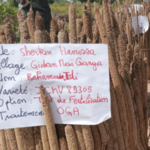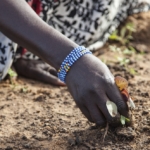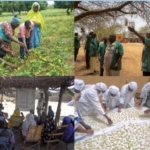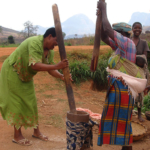


FUMA Gaskiya
Niger
5/2019—5/2023
This farmer research network (FRN) project is led by a large farmer organization with a dynamic leader. Tools and approaches were developed to strengthen the leadership capacity of the farmer federation FUMA Gaskiya. During the previous two phases of the project, the FRN tested new crops and varieties and locally available agronomic options to tackle major agricultural production constraints and risk management of women farmers in Niger. There are still gaps that need to be addressed. There is need to refine the initial farmer typology; the next version will include men to serve a wider range of projects. Locally available AEI options will be tested by different farmer types to identify AEI options for different contexts. The basket of AEI options will be widened based on FUMA Gaskiya’s partnership with other projects including five CCRP-funded projects and nine other projects / development programs. There is need to fully explore this basket of options and associated principles in an integrated manner. Farmer-friendly data management tools need to be developed. And there is a need to document the learnings regarding the FRN model led by a farmer federation.
The overall goal of this project is to enhance smallholder farming families’ well-being in Niger through large-scale, farmer-led evaluation of AEI options and co-creation of farmer-friendly data management and sharing, therefore co-learning about AEI options and principles. Women’s agricultural production systems will remain a focus of the project, as improvement of these systems often directly benefits family welfare.
Output 1: The existing FUMA Gaskiya farmer’s typology is refined. This will lead to FUMA Gaskiya having a better understanding of the context, diversity, equity and inclusion (DEI) of its members, both women and men farmers, young and old, richer and poorer farmers etc.
Outcome 1.1: In the short term, the refined farmer typology will be used in the design of experiments and analysis of field data not only in the current project, but also in other projects.
Outcome 1.2: In the longer term, the refined farmer typology is expected to support the development of context-specific recommendations;
Output 2: Co-creation of data and farmer-friendly data management system (to collect, analyze, interpret and visualize data from large-N trials): A data management system that combines the refined farmer typology with existing field trial data is developed and documented; To ease co-creation among FUMA farmers, different options for data collection and data visualization with farmers and finding out what suits them best.
Outcome 2.1: Different options for data collection and data visualization will allow farmers to find out what suits them best.
Outcome 2.2: Partners use the app and farmer friendly data visualization in their project sites to foster joint leaning
Output 3: Performance of systems diversification and integrated AEI options co-validated with farmers in large-N trials in two regions of Niger (Maradi and Dosso).
Outcome 3.1: Farmers’ innovative coping strategies against farming constraints are identified.
Outcome 3.2: New systems diversification and integrated AEI options adapted to local conditions are used by farmers and partners in context-specific ways.
Outcome 3.3: Economic benefits and risk reduction potential of new AEI options (tested in the basket of options) are determined for different contexts and scenarios.
Outcome 3.4: Due to participation of large numbers of farmers, selected, proven AEI options (such as the urine application) are expected to reach significant adoption rates.
Output 4: Tools are developed that enable FUMA Gaskiya to better communicate and support decision-making processes and assure appropriate learning with its members and partners.
Outcome 4.1: New and existing communication tools are used and help to share knowledge about context-specific systems diversification or intensification options, leading to enhanced adoption rates.
Outcome 4.2: International public awareness about the potential of new agricultural technologies using local resources and about the Farmer Research Network approach used by FUMA Gaskiya is increased (using conference papers, articles, video, etc.)
Outcome 4.3: Public institutions use the developed knowledge in order to adapt their own agricultural policies.
Outcome 4.4: Extensionists, researchers, students, and farmers are aware of the importance of FRN approach and co-operate for appropriate learnings.
All together, the above outputs and outcomes are expected to contribute to refining FUMA Gaskiya’s FRN approach with special emphasis on AEI, co-creation and data sharing with farmers.





Notifications